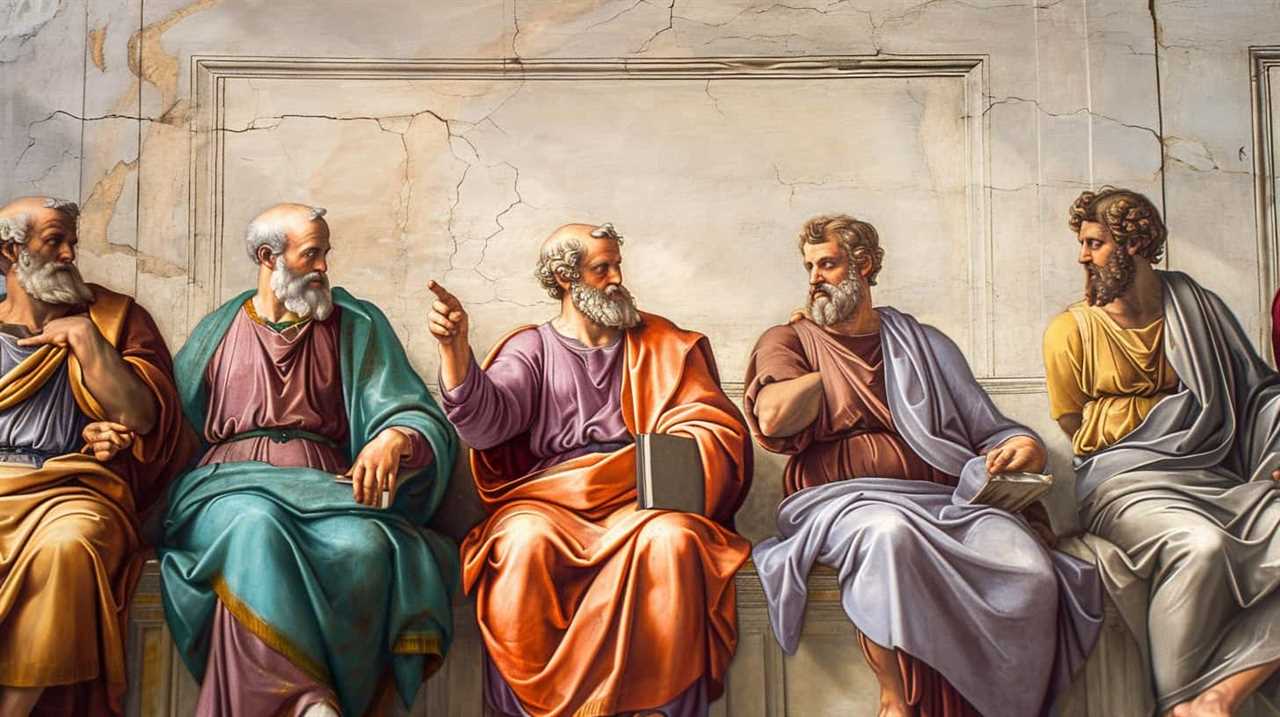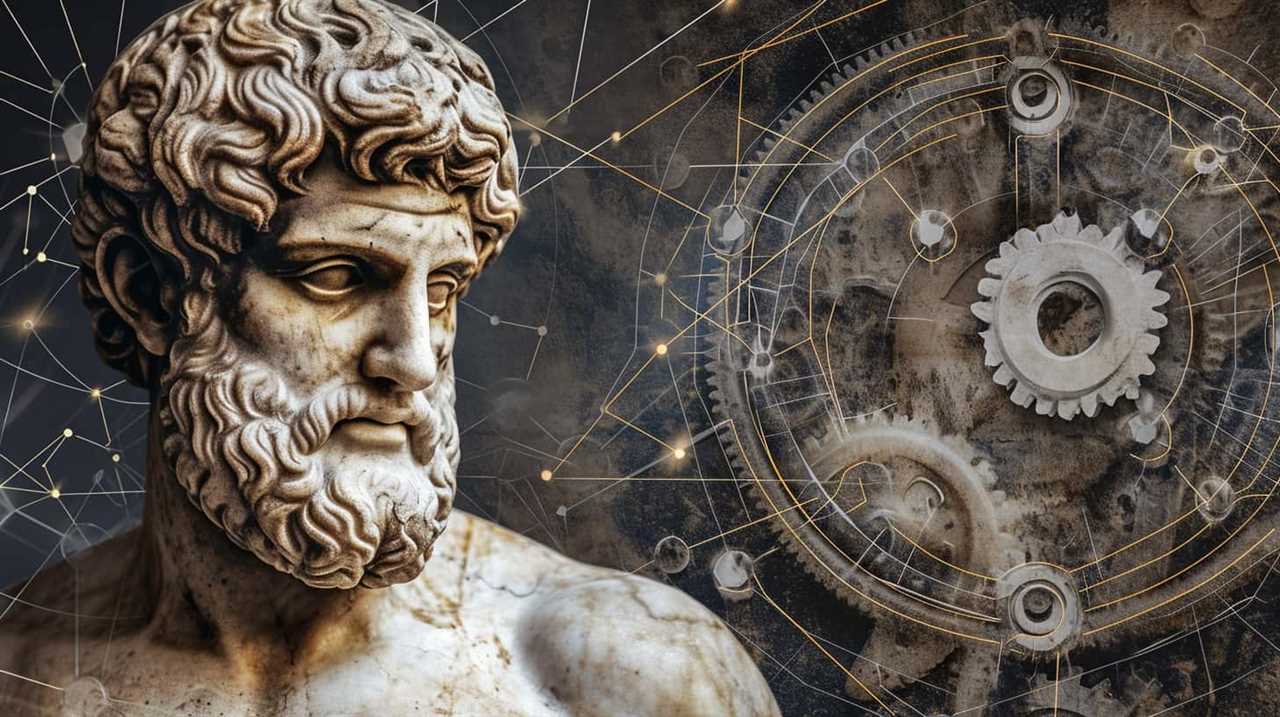Throughout history, great minds have pondered the enigmatic nature of consciousness, shedding light on the profound questions that puzzle us all. Embark on a journey through the 6 most compelling philosophical quotes about consciousness with us, as we delve into a realm of intellectual exploration, challenging the boundaries of our understanding.
From Plato’s timeless proclamation that ‘the unexamined life is not worth living,’ to Descartes’ profound realization that ‘I think, therefore I am,’ these quotes embody the essence of human thought and contemplation.
Hume’s assertion that the self is a mere bundle of perceptions, and Kant’s belief that knowledge begins with experience, further ignite the sparks of innovation within us. Nietzsche’s bold claim that there are no facts, only interpretations, and Sartre’s notion that existence precedes essence, push us to question the very fabric of reality.
Join us as we delve into the depths of consciousness, uncovering the wisdom of the ages.
Key Takeaways
- Self-reflection and self-awareness are crucial for understanding our thoughts, emotions, and desires, and unlocking our potential.
- Different perspectives on consciousness exist, such as Descartes’ idea that "I think, therefore I am," and the theories of dualism vs. monism and Eastern vs. Western perspectives.
- Hume challenges the notion of a unified and enduring self, suggesting that the self is merely a bundle of perceptions and experiences.
- Our understanding of consciousness is limited by the boundaries of our sensory perception, but consciousness plays a crucial role in shaping our understanding of the world through interpretation and directing our attention.

Plato: "The Unexamined Life Is Not Worth Living
As we delve into the exploration of consciousness throughout history, we come across Plato’s profound statement that the unexamined life isn’t worth living. This concept of self-reflection, as put forth by Plato, challenges us to question the very essence of our existence and the purpose of our lives. Plato believed that true wisdom comes from introspection and self-awareness, and that without it, we’re merely existing, not truly living.
Plato’s idea aligns with Descartes’ theory of self-existence, which posits that our consciousness is fundamental to our identity. Descartes famously stated, ‘I think, therefore I am,’ emphasizing the significance of self-reflection in establishing our existence. Both Plato and Descartes believed that by examining our thoughts, beliefs, and actions, we gain a deeper understanding of ourselves and the world around us.
In today’s fast-paced, technology-driven society, the importance of self-reflection has become even more crucial. We’re constantly bombarded with external stimuli, making it easy to lose sight of our true selves. Engaging in introspection allows us to reconnect with our innermost thoughts and emotions, fostering personal growth, and a better understanding of our values and aspirations.
Innovation often stems from self-awareness and the ability to critically evaluate our own ideas and beliefs. By examining our lives, we can identify areas for improvement, challenge societal norms, and push the boundaries of what’s possible. Plato’s concept of self-reflection and Descartes’ theory of self-existence remind us that true innovation begins with the examination of our own consciousness.

Descartes: "I Think, Therefore I Am
Descartes’ famous statement, ‘I think, therefore I am,’ is a cornerstone of philosophy and self-awareness. It invites us to consider the relationship between our thoughts and our existence, challenging us to question the nature of consciousness itself.
From Descartes’ perspective, consciousness arises from the act of thinking, affirming the primacy of our own thoughts in defining our reality. This raises intriguing questions about the nature of our minds, the boundaries of our consciousness, and the role of introspection in understanding ourselves.
Descartes’ Famous Statement
We firmly believe that our existence is unquestionably confirmed through the profound declaration of Descartes: ‘We think, therefore we are.’
Descartes’ impact on philosophy can’t be overstated, as his statement revolutionized our understanding of consciousness and self-awareness. By asserting that our very existence is rooted in the act of thinking, Descartes laid the foundation for a new philosophical framework. This statement not only affirmed the existence of the self but also highlighted the power of the human mind in shaping reality.
Descartes’ contributions to philosophy have sparked countless debates and inquiries into the nature of consciousness, the relationship between mind and body, and the limits of human knowledge. With this profound declaration, Descartes paved the way for a deeper exploration of the philosophy of self-awareness.
Now, let’s delve into the complexities of this fascinating subject.
Philosophy of Self-Awareness
Continuing from Descartes’ famous statement, our understanding of consciousness and self-awareness is further explored through the philosophy of self-awareness, encapsulated by the profound declaration ‘I think, therefore I am’. This philosophy of identity delves into the intricate nature of the self and the role of self-reflection and introspection in our perception of reality. It invites us to question the very essence of our existence and challenges us to confront the limitations of our own consciousness. Through self-reflection, we gain insight into our thoughts, emotions, and desires, allowing us to better understand ourselves and our place in the world. It is through this process of introspection that we are able to navigate the complexities of life and unlock the potential for growth and self-actualization.
| Philosophy of Identity | Self-Reflection | Introspection |
|---|---|---|
| Explores the nature of the self | Offers insight into our thoughts, emotions, and desires | Allows us to navigate life and unlock our potential |
| Challenges our perception of reality | Facilitates understanding of ourselves and our place in the world | Promotes growth and self-actualization |
| Raises questions about the essence of our existence | Helps us confront the limitations of our consciousness | Encourages introspective exploration |
Perspectives on Consciousness
In the exploration of consciousness, one of the most renowned perspectives is encapsulated by the profound declaration ‘I think, therefore I am’. This statement, famously coined by René Descartes, highlights the fundamental connection between thinking and existence.
However, when delving deeper into the nature of consciousness, one encounters a multitude of perspectives that offer diverse insights. Here are four key ideas that shed light on the complexities of consciousness:
- Dualism vs. Monism: Different theories on the nature of consciousness.
- Eastern vs. Western Perspectives: Contrasting views on consciousness from different philosophical traditions.
- The role of perception: Investigating how our senses shape our consciousness.
- The relationship between mind and body: Examining the interplay between mental and physical experiences.
These perspectives offer varying lenses through which to view consciousness, providing us with a rich tapestry of ideas to ponder.
Transitioning into the subsequent section, we now turn to David Hume’s notion that ‘the self is nothing but a bundle of perceptions’.

Hume: "The Self Is Nothing but a Bundle of Perceptions
Hume’s theory posits that our sense of self can be reduced to a collection of perceptions. According to Hume’s critique, our understanding of perception is the foundation of our concept of self. He argues that there is no underlying substance or essence that constitutes the self, but rather, it is merely a bundle of ever-changing perceptions.
To better understand this concept, let’s consider a simple table:
| Perception | Experience |
|---|---|
| Seeing | A beautiful sunset |
| Hearing | Melodious music |
| Tasting | Delicious food |
| Feeling | Warm sunshine |
In this table, each perception represents a momentary experience that contributes to our overall sense of self. Hume suggests that our identity is not fixed but rather a continuous flow of perceptions that shape our consciousness.
This perspective challenges traditional notions of a stable and enduring self. It invites us to question our assumptions about who we are and how we perceive the world. By recognizing the transient nature of our perceptions, we open ourselves up to a more fluid and dynamic understanding of the self.
Hume’s theory encourages us to embrace change and adaptability, offering a fresh perspective on personal growth and self-discovery. It prompts us to explore the depths of our consciousness and consider the profound implications of perceiving ourselves as a bundle of perceptions.

Kant: "Our Knowledge Begins With Experience
Kant’s empirical approach to knowledge sparks a profound inquiry into the nature of our understanding. By asserting that our knowledge begins with experience, Kant challenges us to consider the boundaries of our sensory perception and the role of consciousness in shaping our understanding of the world.
This raises thought-provoking questions about the extent to which our knowledge is limited by our subjective experiences and the ways in which consciousness filters and interprets our perceptions.
Kant’s Empirical Approach
Our understanding of consciousness is deeply influenced by an empirical approach, as we recognize that knowledge originates from our experiences. Kant’s rationalism, as outlined in his Critique of Pure Reason, challenges this notion by asserting that our knowledge doesn’t solely come from experience, but also from innate concepts and principles. However, Kant also acknowledges the importance of empirical knowledge in shaping our understanding of consciousness.
- Kant’s critique of pure reason highlights the limitations of pure rationalism in comprehending consciousness.
- He argues that while reason provides the framework for knowledge, experience is necessary to fill in the content.
- Kant’s empirical approach emphasizes the role of sensory perception and observation in generating knowledge about consciousness.
- Through empirical investigation, we can gain insights into the workings of our own minds and the nature of consciousness itself.
Limits of Sensory Perception
Our understanding of consciousness is limited by the boundaries of our sensory perception, as our knowledge begins with our experiences.
As humans, we rely on our senses to gather information about the world around us. However, our sensory organs can only detect a limited range of stimuli, such as light, sound, taste, touch, and smell.
This means that there are aspects of reality that lie beyond the scope of our perception. We’re unable to directly perceive phenomena like ultraviolet or infrared light, or hear sounds that are beyond the range of our hearing.
These limitations raise profound questions about the nature of reality. Are there dimensions or phenomena that exist beyond our perception? Is our understanding of the world incomplete?
Exploring the limits of human perception opens up new avenues of inquiry and challenges us to question the boundaries of our knowledge.
Role of Consciousness in Knowledge
One key aspect of consciousness is that our knowledge begins with experience. Our consciousness plays a crucial role in learning, shaping our understanding of the world around us. It’s through our conscious awareness and perception of the external stimuli that we acquire information and form beliefs.
Here are four ways in which consciousness influences our knowledge:
- Attention: Consciousness directs our attention towards specific stimuli, allowing us to focus on relevant information and filter out distractions.
- Interpretation: Our conscious mind interprets the sensory input, giving meaning and significance to the information we receive.
- Memory: Consciousness plays a vital role in encoding and retrieving memories, allowing us to retain and recall knowledge.
- Decision-making: Consciousness enables us to evaluate different options, make reasoned choices, and take actions based on our knowledge and understanding.

Nietzsche: "There Are No Facts, Only Interpretations
Nietzsche challenges the notion of objective truth by asserting that interpretations, rather than facts, shape our understanding of reality. This provocative statement forces us to reconsider the foundations of our knowledge and the role of perception in shaping our worldview.
In a world where we often seek concrete facts and objective truths, Nietzsche’s assertion reminds us that our understanding of reality isn’t fixed, but rather subject to interpretation.
The importance of self-examination becomes evident in light of Nietzsche’s assertion. If interpretations are the lens through which we perceive reality, then it becomes crucial to critically examine our own biases and assumptions. This self-reflection allows us to recognize the limitations of our own perspectives and opens the door for new, innovative ways of thinking.
Nietzsche’s perspective challenges us to question the very nature of knowledge itself. Are facts truly objective, or are they simply interpretations that have gained widespread acceptance? By acknowledging the subjective nature of interpretations, we’re encouraged to approach knowledge with a sense of curiosity and skepticism, constantly questioning and reevaluating our understanding of the world.
In a society that often values certainty and absolutes, Nietzsche’s assertion serves as a reminder that there’s always room for interpretation and multiple perspectives. Embracing this uncertainty can lead to a more open-minded and innovative approach to knowledge, allowing us to explore new possibilities and challenge existing paradigms.

Sartre: "Existence Precedes Essence
Sartre’s assertion that ‘Existence precedes essence’ challenges traditional notions of human nature and encourages us to question the inherent meaning and purpose of our existence. This idea lies at the heart of existentialism, a philosophical movement that emphasizes individual freedom and responsibility.
Sartre argues that unlike objects whose essence precedes their existence, human beings first exist and then define their essence through their choices and actions. This revolutionary perspective challenges the idea that there’s a predetermined meaning or purpose to our lives. Instead, it suggests that we’re constantly shaping our own identities and determining the significance of our existence.
- Rejection of Essentialism: Sartre’s philosophy rejects the notion that humans have fixed, predetermined natures. Instead, he argues that we’re free to create our own essence through our choices.
- Emphasis on Personal Responsibility: According to Sartre, since existence precedes essence, we bear the ultimate responsibility for our actions and their consequences.
- Anxiety and Authenticity: Existentialism highlights the anxiety that arises from the realization of our freedom and the need to make choices. It also emphasizes the importance of living authentically, true to one’s own values and beliefs.
- Human Potential and Possibility: Sartre’s perspective encourages us to recognize the vast potential and possibilities inherent in our existence. It invites us to embrace our freedom and actively engage in creating a life of meaning and purpose.
Sartre’s assertion challenges us to explore the depths of our existence, empowering us to forge our own path and question the traditional notions that seek to limit our potential. It’s through this existential lens that we can discover the true essence of our being and unlock the boundless possibilities that lie within.

Frequently Asked Questions
How Did Plato Define the Concept of the "Unexamined Life" and Why Did He Believe It Was Not Worth Living?
Plato defined the concept of the ‘unexamined life’ as living without critical self-reflection. He believed it was not worth living because true fulfillment and understanding can only be achieved through self-awareness and the pursuit of wisdom.
What Does Descartes Mean by the Statement "I Think, Therefore I Am" and How Does It Relate to the Concept of Consciousness?
We are aware of Descartes’ statement, "I think, therefore I am," which reflects his belief that the existence of consciousness is undeniable. This idea stands in contrast to Plato’s emphasis on self-examination, Hume’s perception of the self, Kant’s view on experiential knowledge, and Nietzsche’s perspective on interpretations of consciousness.
How Did Hume Argue That the Self Is Merely a Bundle of Perceptions and What Implications Does This Have for Our Understanding of Consciousness?
Hume’s bundle theory challenges traditional notions of selfhood by arguing that the self is just a collection of perceptions. This has profound implications for our understanding of consciousness, forcing us to question the unity and continuity of our identities.
What Did Kant Mean by the Assertion That Our Knowledge Begins With Experience and How Does This Shape Our Understanding of Consciousness?
When Kant said that our knowledge begins with experience, he meant that our understanding of consciousness is shaped by the things we perceive. This theory of knowledge challenges traditional notions and invites innovation in our understanding of consciousness.
In What Context Did Nietzsche Claim That There Are No Facts, Only Interpretations, and How Does This Perspective Challenge Conventional Notions of Consciousness?
Nietzsche’s perspective on interpretations challenges conventional notions of consciousness by asserting that there are no facts, only interpretations. This challenges Plato’s concept of the ‘unexamined life’ and Descartes’ statement ‘I think, therefore I am’, while aligning with Hume’s argument on the self as a bundle of perceptions and Kant’s assertion on knowledge beginning with experience.

Can Philosophical Quotes on Logic and Reasoning also Apply to Consciousness and vice versa?
Many of the best philosophical quotes on logic and reasoning can also be applied to consciousness. The principles of sound reasoning and critical thinking are essential in understanding the complexities of the mind and subjective experience. Likewise, insights into consciousness can inform our understanding of logic and reasoning.
Conclusion
In exploring the profound insights of these philosophical quotes on consciousness, we’re reminded of the boundless complexity and mystery that lies within our own minds.
From Plato’s call for self-reflection to Sartre’s emphasis on personal responsibility, these thinkers have challenged us to question our assumptions and delve deeper into the nature of our existence.
Ultimately, the truth may elude us, but the journey of contemplation and self-discovery is a pursuit worth undertaking.
Lauren’s talent in writing is matched by her passion for storytelling. Her love for books and deep understanding of culture and entertainment add a distinct flavor to her work. As our media and press contact, Lauren skillfully bridges the gap between afterQuotes and the broader media landscape, bringing our message to a wider audience.








